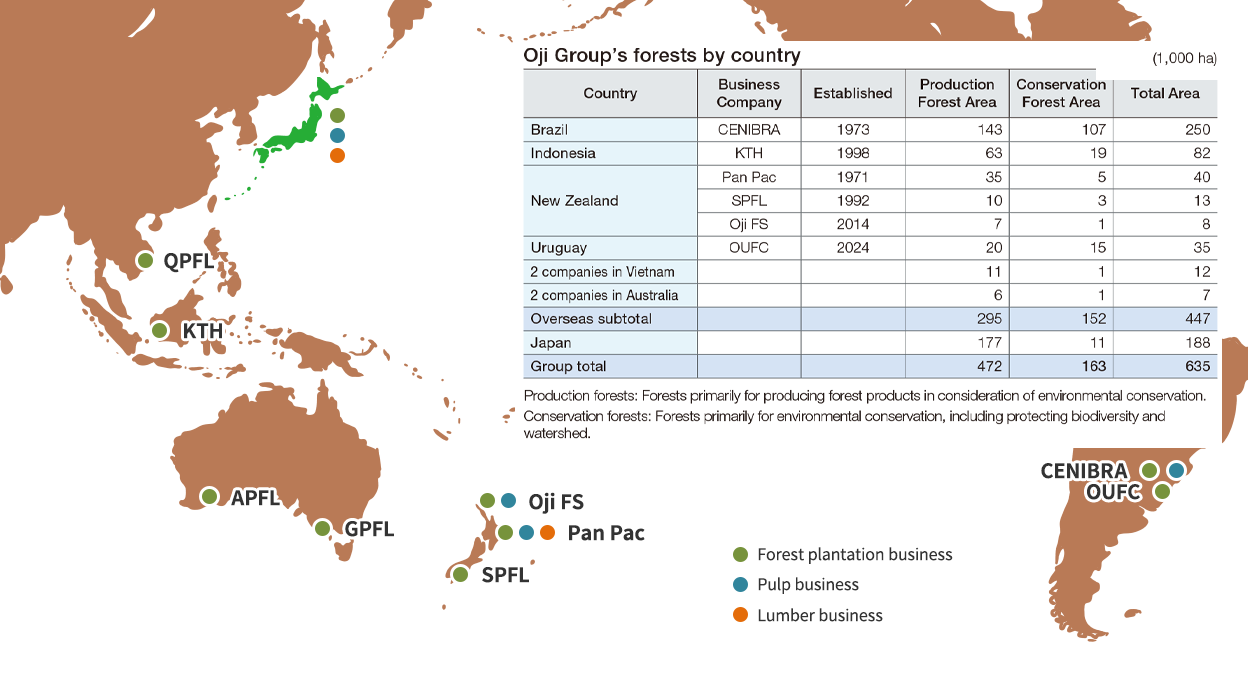
The Oji Group operates forest plantations in ten areas in six countries. As of July 2024, we had 447k ha of overseas forest plantations and 152K ha of conservation areas for preserving biodiversity and basins.
We employ forest certification programs* to ensure our forests are managed sustainably from environmental, social, and economic perspectives. In FY2023, 97% of our overseas forest plantations were certified.
These plantations contribute to sustainable, prosperous local communities by securing wood raw materials, absorbing and storing CO2, and creating jobs and industries.

In forest ecosystems, trees absorb CO2, storing it in their trunks, branches, leaves, and roots as they grow. Even after they die, trees decompose gradually, releasing CO2 slowly as soil organic matter rather than all at once.
Harvested trees also store carbon for long periods in products like lumber for housing or paper. Additionally, using waste wood and construction materials for biomass energy—an alternative to fossil fuels—helps reduce CO2 emissions.
The Oji Group actively addresses climate change by expanding forest plantations and replanting after harvest, ensuring ongoing CO2 absorption and storage (Sustainable Forest Management). We also contribute through paper recycling, where products made from plantation wood continue to store carbon.
Massive forest fires have become common occurrences in many parts of the world, a critical global issue that needs urgent global solutions. CENIBRA, which has forest plantations and a pulp mill in Brazil, has introduced an innovative forest fire prevention and fighting system using artificial intelligence (AI) for their 250,000 ha forests. The company has 39 watchtowers equipped with 360 degrees rotating cameras. When the AI detects smoke and fires, the monitoring room notifies fire crews nearest to the site of the incidents. They start firefighting immediately. The AI-equipped cameras are more efficient than human eyes and can locate the accurate fire site within 1-2 minutes. CENIBRA has reduced forest fire risks significantly.



At overseas plantation projects, we have worked on planting fast-growing trees such as eucalyptus, acacia hardwoods, and radiata pine softwoods. In Brazil, our subsidiary CENIBRA has dedicated years to improving tree varieties through breeding. The team cross-pollinated trees and selected about 15 elite strains from over 20,000 candidates. These strains were chosen for their exceptional growth rates and high pulp productivity. Similar breeding programs are ongoing with partners such as Indonesia’s KTH. By planting these high-performance trees, we aim to boost forest growth and speed up CO₂ absorption in our forestry operations.


The Asia Agriculture and Forestry Technology Center (AFTEC) conducts research and technology development to improve the productivity of plantation trees in Southeast Asia.
By planting fast-growing, high-quality tree varieties, AFTEC contributes to both business profitability and the preservation of natural forests, reducing illegal logging. The center focuses on improving eucalyptus and acacia tree species using breeding techniques developed in various countries.
Fast-growing trees absorb significant nutrients, and the use of heavy machinery for harvesting can compact the soil, potentially affecting future growth. To ensure sustainable plantation operations, it’s essential to replenish nutrients and maintain healthy soil conditions through tilling and other measures. AFTEC conducts soil and tree nutrition analyses and tests fertilization and tilling methods to safeguard the soil environment.


In recent years, datasets that show results of analysis of global forest changes using satellite data and platforms that display maps of these results have been developed. This has made it easy for anyone to conduct extensive and long-term forest monitoring. However, these data have the issue of misinterpreting logging operations in sustainable forestry management as deforestation. Therefore, these data should be used with caution.
Oji Holdings commissioned a third party proficient in satellite analysis to analyze forest changes by combining satellite data, local natural vegetation information, and operational history for CENIBRA's company-owned forests, the largest in the Oji Group. The results show that it is highly likely that 99.9% of the CENIBRA-owned forests labeled as `Forest Cover Loss' in open dataset do not correspond to deforestation.
The Oji Group will continue to promote sustainable forest management and utilize various analytical technologies to engage in natural monitoring and information disclosure.